Truth Be Told
Conversations that debunk myths, explore case studies and identify the keys to effective communication with a Certified Forensic Interviewer and special guests. Need to talk to an employee about a disciplinary issue? A family member or significant other about an uncomfortable topic? Attempting to uncover the truth of ”what really happened” through effective questioning and active listening? With unique perspectives from interrogators, exonerees, academics and professionals across multiple disciplines, learn how strategic communication can work to your advantage. Powered by Wicklander-Zulawski & Associates (WZ) and the International Association of Interviewers (IAI), ”Truth Be Told” brings to you some of the leading voices in the space of communication, investigations and interpersonal behaviors.
Episodes
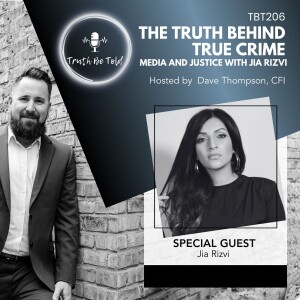
Wednesday Mar 19, 2025
Wednesday Mar 19, 2025
In this conversation, Dave Thompson and Jia Rizvi explore the intricacies of conversation, the impact of wrongful convictions, and the journey into filmmaking. They discuss the emotional toll of storytelling, the ethics involved in documentary filmmaking, and the importance of understanding the criminal justice system. Jia shares her personal experiences and insights gained from working with wrongfully convicted individuals, emphasizing the need for genuine representation and advocacy in storytelling. In this conversation, Jia and Dave explore the intricacies of interviewing in the true crime genre, emphasizing the importance of creating a comfortable environment for subjects to share their stories. They discuss the emotional weight of these narratives, the challenges of resistance from various parties, and the purpose behind documentary filmmaking, particularly in raising awareness about wrongful convictions. The conversation highlights the power of silence in interviews and the impact of media on public perception of justice.
Learn more about Jia here: Documentary Filmmaker | Jia Rizvi
Follow us on Instagram!
Wrongful convictions have a profound impact on individuals and families.
Filmmaking can be a powerful tool for advocacy and storytelling.
Understanding the criminal justice system is crucial for effective storytelling.
Ethics in storytelling must be prioritized to avoid re-traumatizing subjects.
Real stories deserve genuine representation without sensationalism.
The emotional toll of filmmaking can be significant for creators.
Advocacy for wrongfully convicted individuals is a driving force for many filmmakers.
Personal experiences shape the passion for storytelling and advocacy. Creating a comfortable environment is key for interviews.
Silence can encourage subjects to share more.
Authenticity in storytelling is crucial.
Many people are unaware of the prevalence of wrongful convictions.
Documentaries can significantly influence public perception.
Interviewing requires a balance of structure and flow.
Emotional narratives can be challenging to navigate.
The impact of wrongful convictions extends beyond the individual.
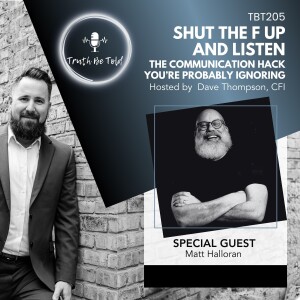
Wednesday Mar 05, 2025
Wednesday Mar 05, 2025
In this episode of the Truth Be Told podcast, host Dave Thompson engages with Matt Halloran to explore the critical role of listening in effective communication. They discuss the undervalued skill of listening, the importance of silence, and how engaged listening can transform personal and professional relationships. Matt shares insights from his experiences, including his background in therapy and financial services, emphasizing that listening is not just about hearing words but understanding the underlying emotions and intentions. The conversation also touches on practical exercises to improve listening skills and the different types of communicators. In this conversation, Matt Halloran discusses various communication styles and the importance of adapting to different conversational dynamics. He introduces the metaphor of different types of 'divers' to illustrate how people engage in conversations, emphasizing the need for active listening and holding space for emotions. The discussion also touches on the significance of silence in communication and how these principles apply in both face-to-face and digital interactions. Halloran provides practical tips for improving conversational skills and building rapport, ultimately highlighting the transformative power of listening.
Are you following us on Instagram?
Connect with Matt:
Matt Halloran | Shut The F Up
Shut the F Up and Listen
Matt Halloran on LinkedIn
Truths:
Listening is often confused with hearing; true listening requires intention.
Engaged listening is about understanding, not just responding.
People often listen to respond rather than to understand.
The ability to sit in silence can change conversations.
Listening is a skill that can be developed and practiced.
Empathy is crucial in understanding others' perspectives.
Different types of communicators can impact the flow of conversation.
Practical exercises can enhance listening skills in everyday situations.
Understanding different communication styles can enhance interactions.
Active listening is crucial for meaningful conversations.
Holding space allows others to process their emotions.
Adapting to the emotional state of others is essential.
Using open-ended questions fosters deeper discussions.
Listening is an act of love and respect.
Practicing these skills can improve personal and professional relationships.
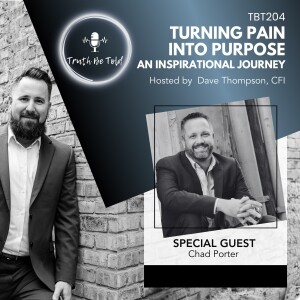
Wednesday Feb 19, 2025
Wednesday Feb 19, 2025
In this episode of the Truth Be Told podcast, host Dave Thompson speaks with Chad Porter, who shares his inspiring journey from being a star athlete to surviving a life-altering accident. The conversation delves into the power of choice, the impact of Chad's athletic background, the day of the accident, and the aftermath that followed. Chad reflects on the importance of free will, the support of his family, and how he turned a traumatic experience into a message of hope and resilience for others. In this conversation, Chad Porter shares his profound journey of resilience and healing after a life-altering accident. He discusses the emotional masks people wear, the importance of facing reality, and the power of humor in overcoming adversity. Chad emphasizes the significance of treating others with kindness and understanding, as everyone is fighting their own battles. He reflects on his transition from personal struggle to inspiring others through storytelling, highlighting the impact of genuine connection and support. Throughout the dialogue, he offers insights on maintaining mental health and the universal messages of hope and perseverance that resonate across different audiences.
Learn more about Chad at ChadPorter.org
Follow Chad on Facebook
Follow Chad on Instagram
Follow Chad on LinkedIn
Truths:
Free will gives us the ability to make our own choices every single day.
Regret can hold us back, but we must learn and grow from our experiences.
The power of storytelling can inspire and motivate others.
Life's challenges can lead to unexpected opportunities for growth.
We should not ignore the signs and red flags in our lives.
Finding humor in dark times can be a coping mechanism. Everyone wears a mask to hide their true feelings.
It's important to balance being genuine with putting on a brave face.
Coping mechanisms can sometimes lead to isolation.
Humor can be a powerful tool in dealing with pain.
Facing reality is a gradual process, not an instant revelation.
Support from others is crucial, but so is self-acceptance.
Treating people normally can help them feel less isolated.
Sharing your story can inspire others to overcome their struggles.
Gratitude can shift your perspective and improve mental health.
It's essential to control what you can and let go of what you can't.
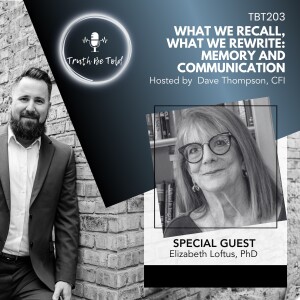
Wednesday Feb 05, 2025
Wednesday Feb 05, 2025
In this conversation, Dr. Elizabeth Loftus, a pioneer in memory research, discusses the complexities of memory accuracy, particularly in the context of eyewitness testimony and its implications for wrongful convictions. The conversation explores how various factors, including questioning techniques and social influences, can distort memories, leading to significant consequences in legal settings. Loftus shares insights from her foundational research on eyewitness memory, emphasizing the importance of understanding memory fallibility in both personal and legal contexts. In this conversation, Elizabeth Loftus discusses the complexities of memory, including the factors that influence memory accuracy, the controversies surrounding memory retrieval, and the implications of false memories in therapeutic settings. She emphasizes the malleability of memories, the importance of context in recall, and the ethical considerations of memory modification. Loftus also shares personal insights on how her research impacts her daily life and offers advice for both researchers and laypeople regarding memory awareness.
Truths:
· Memory accuracy is influenced by many factors, including emotions and questioning.
· Eyewitness misidentification is a significant cause of wrongful convictions.
· People often believe their memories are accurate, even when they are not.
· Leading questions can alter a witness's memory of an event.
· Witnesses can contaminate each other's memories through discussion.
· Social media can spread misinformation that affects memory recall.
· The wording of questions can significantly impact the responses given by witnesses.
· Expert testimony focuses on the reliability of memory, not the outcome of cases.
· Memory can change over time, especially with repeated questioning.
· Understanding memory fallibility is crucial in legal and personal contexts. Memory accuracy is influenced by various factors at different stages.
· Controversies exist around memory retrieval methods and their implications.
· Contextual cues can aid in memory recall but are not always reliable.
· Flashbulb memories, while vivid, can change over time.
· Questioning someone's memory can lead to discomfort and defensiveness.
· Therapeutic practices can unintentionally create false memories.
· Memory modification raises ethical questions about its application.
· People often distort their own memories for self-enhancement.
· False memories can appear detailed and emotional, complicating their validation.
· It's important to approach memory discrepancies with understanding, not suspicion.
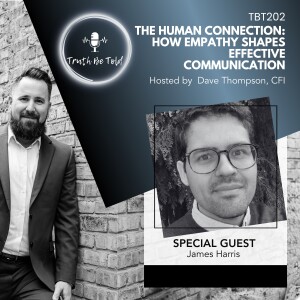
Wednesday Jan 22, 2025
Wednesday Jan 22, 2025
In this episode of the Truth Be Told podcast, host Dave Thompson engages in a deep conversation with James Harris, a former police officer turned senior lecturer. They explore James's transition from law enforcement to academia, the intricacies of investigative interviewing, the importance of empathy in communication, and the challenges of navigating diversity in policing. James shares insights from his extensive experience in the field, emphasizing the need for understanding and rapport in interviews, as well as the impact of past experiences on individuals' interactions with law enforcement. In this conversation, James and Dave explore the intricate balance between empathy and assertiveness in law enforcement, the critical role of interview advisors, and the importance of understanding the interview process. They discuss the 'WISCI' framework for managing witness interviews during critical incidents and emphasize the mental wellness of investigators. The conversation wraps up with insights on decision-making in investigative work, highlighting the need for fairness and justification in actions taken during investigations.
Truths:
Empathy is crucial in communication, especially in high-pressure situations.
The goal of an interview should not be to obtain a confession, but to obtain reliable or actionable information.
Understanding diverse backgrounds is essential in law enforcement, and communication globally.
Past experiences shape individuals' perceptions of authority figures.
Effective communication skills are transferable across various fields.
Building rapport is key to successful interviews.
Judgment can hinder the interview process and lead to misunderstandings.
The importance of context in understanding individuals' behaviors.
Empathy can help bridge gaps between law enforcement and communities. Empathy is crucial in law enforcement interactions.
Assertiveness must be balanced with empathy for effective communication.
Cooperation is preferred over mere compliance in investigations.
Interview advisors play a strategic role in investigations.
Understanding the interviewee's background is essential for effective interviewing.
The 'WISCI' framework helps categorize witnesses in critical incidents.
Mental wellness of investigators is vital for effective performance.
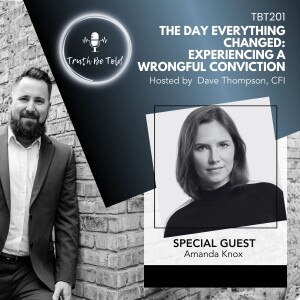
Wednesday Jan 08, 2025
Wednesday Jan 08, 2025
Can you imagine being accused of a crime you didn't commit? Even worse, imagine this happening while outside your home country - and in a language you don't fully understand. What would you do?
In this episode of the Truth Be Told podcast, host Dave Thompson speaks with Amanda Knox about her life after the wrongful conviction that changed her life - and made international headlines.
They discuss the challenges of reclaiming her story, the impact of social media on public perception, and the importance of remembering the victims in wrongful conviction cases.
Amanda shares her experiences leading up to the tragic murder of her friend Meredith Kercher and the chaotic aftermath that followed, including the media's misinterpretation of her reactions and the struggle for truth in a polarized and misinformed world. In this conversation, Amanda Knox shares her harrowing experience of wrongful conviction and the psychological impact of her interrogation. She discusses the assumptions made by investigators, the tactics used during her interrogation, and the broader implications of false confessions. Knox emphasizes the importance of understanding the trauma associated with wrongful convictions and the need for reform in interrogation practices. The conversation also touches on the media narratives that shaped public perception and the ongoing consequences for those wrongfully accused.
Learn more about Amanda's work on her website and check out her podcast, Labryinths.
Truths:
Amanda feels she is still chasing her narrative, as the day her identify was “stolen” was when she was interrogated and told her reality was different than what she knew to be true.
Reactions to the crime scene were misinterpreted, without supporting context or information for the public to know.
Media judgment can (and has) distorted public perception and interpretation of major incidents.
Similar to witnesses and victims exposed to traumatic events, Amanda's emotional response was misunderstood.
Misclassification can lead to devastating consequences in investigations.
The criminal justice system was never on Amanda's radar. Investigators made assumptions that led to wrongful conclusions.
False confessions often stem from coercive tactics or confirmation bias in investigations.
Wrongful convictions affect not just the victim of the crime, but also the wrongly convicted individual, their families and loved ones.
Often forgotten in a wrongful conviction is the impact to public safety which allows the actual perpetrator to continue to commit additional crimes.
Understanding the psychological impact of interrogation is crucial for everyone involved.
Reform in interrogation practices is necessary to prevent false confessions.
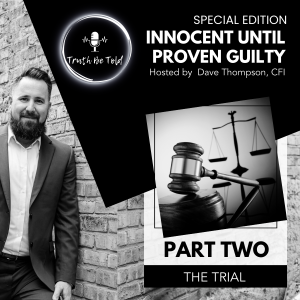
Friday Jan 03, 2025
Friday Jan 03, 2025
Part 2 of this series brings you to the trial preparation of an attempted murder case, with the defendant facing a potential life sentence. We'll hear the emotional perspective of the attorneys throughout the life of the case and explore the psychology of false confessions. This episode also highlights the work of a false confession expert as we discussed how lying about evidence and contamination during an interrogation can lead to unreliable results.
Ever wonder what it’s like behind the scenes of trial preparation for attempted murder? In this two-part Special Edition of the Truth Be Told podcast, we explore a case from 2014 out of Brooklyn, NY where heroes from FDNY rescued two young children who were trapped inside a burning apartment. As the flames subsided, the investigation ensued, and police were pointed at a primary suspect for the alleged arson. Once in custody, the police conducted an interrogation which produced a controversial confession to the incident. This resulted in the defendant facing multiple charges of attempted murder, assault and arson with the potential of spending life in prison.
However, as the legal team of Adam Heyman, Anna Carlsen and Sarah Siegel learned more about their assigned case – it was not as open and shut as it seemed. This team of attorneys joined the Truth Be Told podcast to give their perspective on how they reviewed the case, prepared for trial and ultimately represented their client. The team also brought in Maria Hartwig, PhD, an expert in false confessions and police interrogation techniques to provide her opinion to the court on the reliability of the confession that loomed over their case. Professor Hartwig also joins the panel to share the research behind false confessions and the common contributors, such as misclassification, coercion and contamination.
This two-part episode is intended to provide you the insight and perspective from the legal team of the defendant, and understanding how an expert witness is effectively used at trial. For investigators, this series also provides several takeaways on how to ensure evidence is collected appropriately and can be relied on for further investigation or prosecution. Our hope is to provide future jurors, investigators, attorneys and anyone involved in the courtroom working group with a new perspective on how our system is built on the foundational premise of “innocent until proven guilty."
*Disclaimer: This podcast series does not represent a comprehensive review of the investigation into this case, but rather highlights the perspective of the defense team. There are no assertions made by the Truth Be Told podcast as to the integrity of the investigation itself or the reliability of the statements provided by involved parties. We encourage listeners to review all the information and formulate their own opinion relative to the case but with a more enlightened perspective provided by our panel of guests.
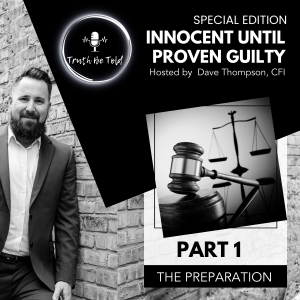
Friday Dec 27, 2024
Friday Dec 27, 2024
Ever wonder what it’s like behind the scenes of trial preparation for attempted murder? In this two-part Special Edition of the Truth Be Told podcast, we explore a case from 2014 out of Brooklyn, NY where heroes from FDNY rescued two young children who were trapped inside a burning apartment. As the flames subsided, the investigation ensued, and police were pointed at a primary suspect for the alleged arson. Once in custody, the police conducted an interrogation which produced a controversial confession to the incident. This resulted in the defendant facing multiple charges of attempted murder, assault and arson with the potential of spending life in prison.
However, as the legal team of Adam Heyman, Anna Carlsen and Sarah Siegel learned more about their assigned case – it was not as open and shut as it seemed. This team of attorneys joined the Truth Be Told podcast to give their perspective on how they reviewed the case, prepared for trial and ultimately represented their client. The team also brought in Maria Hartwig, PhD, an expert in false confessions and police interrogation techniques to provide her opinion to the court on the reliability of the confession that loomed over their case. Professor Hartwig also joins the panel to share the research behind false confessions and the common contributors, such as misclassification, coercion and contamination.
This two-part episode is intended to provide you the insight and perspective from the legal team of the defendant, and understanding how an expert witness is effectively used at trial. For investigators, this series also provides several takeaways on how to ensure evidence is collected appropriately and can be relied on for further investigation or prosecution. Our hope is to provide future jurors, investigators, attorneys and anyone involved in the courtroom working group with a new perspective on how our system is built on the foundational premise of “innocent until proven guilty."
Disclaimer: This podcast series does not represent a comprehensive review of the investigation into this case,but rather highlights the perspective of the defense team. There are no assertions made by the Truth Be Told podcast as to the integrity of the investigation itself or the reliability of the statements provided by involved parties. We encourage listeners to review all the information and formulate their own opinion relative to the case but with a more enlightened perspective provided by our panel of guests.
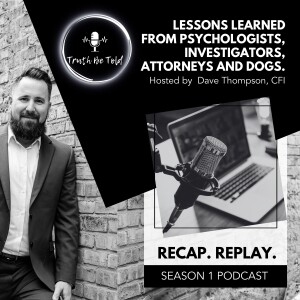
Wednesday Dec 11, 2024
Wednesday Dec 11, 2024
Do you interact with people who lie to you? Do you ever have to engage in difficult conversations? How well are you able to articulate your emotions? We explored all of this and more in Season 1 of the Truth Be Told Podcast!
In this recap of Season One of the Truth Be Told podcast, host Dave Thompson, Certified Forensic Interviewer, reflects on the incredible journey of 25 episodes, highlighting key lessons learned from various guests. The conversation emphasizes the importance of effective communication, the integration of science into practice, leadership, self-development, and storytelling. Each chapter delves into these themes, showcasing insights from psychologists, attorneys, and other professionals, ultimately aiming to enhance listeners' communication skills in both personal and professional contexts.
Truths:
Effective communication is not just an art; it involves scientific principles that can be applied in practice.
Leadership and self-awareness are crucial for personal and professional development.
Storytelling is a powerful tool for effective communication and building rapport.
Asking the right questions can lead to more information and better outcomes in conversations.
Understanding the power dynamics in conversations can help prevent misinformation.
Self-development is a continuous journey, and owning one's experiences is vital for growth.
The importance of mental health awareness in leadership roles cannot be overstated.
Creating a comfortable environment encourages open communication and sharing of stories.
Learning from past experiences and applying those lessons is key to becoming a better communicator.
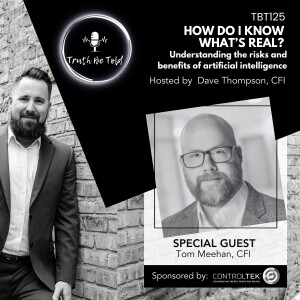
Wednesday Nov 06, 2024
Wednesday Nov 06, 2024
In this episode of the Truth Be Told podcast, host Dave Thompson and guest Tom Meehan, CFI delve into the multifaceted world of artificial intelligence (AI). They explore the evolution of AI, its applications in various fields, and the inherent risks and benefits associated with its use. The conversation covers topics such as the impact of AI on education, the challenges of plagiarism, the phenomenon of deep fakes, and the role of voice assistants in enhancing communication. Throughout the discussion, they emphasize the importance of critical thinking and skepticism in an age where misinformation can easily spread. Tom shares insights from his extensive experience in technology and investigations, providing listeners with practical advice on navigating the complexities of AI.
Truths:
The introduction of ChatGPT made AI more accessible to the public.
AI can enhance efficiency but also poses risks of fraud and misinformation.
Deep fakes present significant challenges in verifying authenticity.
Voice assistants are evolving to provide more natural interactions.
Misinformation is a major concern with the rise of AI technology.
Critical thinking is essential when evaluating information sources.
AI can assist in education but may also lead to plagiarism issues.
Understanding the source of information is crucial in investigations.
The future of AI holds both promise and potential pitfalls.
Thanks to ControlTek for supporting this episode!

Insights from a Certified Forensic Interviewer
Obtaining information from people who are reluctant to share it is a daily task for investigators. However, these same strategies may apply in your everyday life. Listen to conversations from the perspective of a Certified Forensic Interviewer as he talks with guests from all disciplines to help you become a better communicator. Guests include expert interrogators, inquisitive parents, relationship experts, scholars, customer service professionals and more!
To learn more about becoming a better interviewer, check out our training opportunities.
Become a member of our global network at the International Association of Interviewers.





